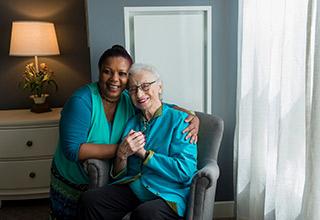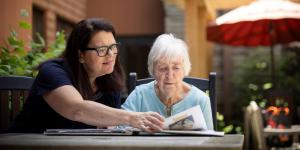Planning and Finding Support After a Dementia Diagnosis
Learn how geriatric social workers can help guide you forward in the wake of an Alzheimer’s disease or dementia diagnosis.

If you or someone you love has been exhibiting memory problems, you may be feeling overwhelmed. What can you expect next? Where can you turn to for a diagnosis and treatment? What assistance will you need in the future? You’ll likely realize that you need guidance when it comes to identifying appropriate support and services and accessing resources.
You’ll want to seek and receive care from the right specialists to obtain neurological evaluations and clarify a potential diagnosis. A geriatric social worker can also help you develop a plan and provide information about community support and resources as you move forward and come to terms with your journey ahead.
Let’s take a look at some of the options and considerations you should keep in mind when developing a dementia care plan.
Connect with dementia resources that fit your needs
Often, the first signs of a memory disorder that families notice in a loved one are that they are not completing typical daily routines such as personal hygiene, or that they are less motivated to socialize and are having increased difficulty keeping themselves positively engaged. Some family members may be available and capable of providing care and supervision to a cognitively declining loved one, while others may not. Some families may need caregivers from outside the household, or seek care and support from outside the home, such as through an adult day health program. Discerning the best care scenario for your situation can be very confusing.
Families often have preconceived notions about the type of support they need, but do not know how to find it. Sometimes what they thought they needed may not be appropriate, available, accessible, or affordable for them. A family member may believe a senior center is a good idea for their loved one, not realizing that it lacks supervision and security — their loved one could walk out the door without anyone noticing, which is dangerous when dementia is more severe. In those situations, an adult day health program may be more appropriate.
Community resources that can be helpful include:
- Local senior centers can offer support, activities, and social groups for older adults. In Massachusetts, you can find your closest senior center on the Massachusetts Councils On Aging website.
- Adult day health programs offer more security and supervision than a local senior center and are often more appropriate for people whose dementia has started to progress.
- Respite services for caregivers can offer a much-needed break for caregivers while ensuring people with dementia are safe and cared for on a short-term basis.
- Support groups can be valuable resources for people with dementia and their caregivers.
- Long-term care is worth considering when a person with dementia needs more care than they can get at home.
Educational resources for people with dementia and their families include:
- The Alzheimer’s Association offers many valuable educational resources that can help families educate themselves about dementia, including webinars, presentations, and downloadable resources for patients and caregivers.
- The National Institute on Aging at the National Institutes of Health maintains Alzheimers.gov to connect people living with Alzheimer’s disease and dementia and their families with federal resources that provide education and support.
- The Massachusetts state government has compiled a list of resources for family caregivers of people with dementia, including free counseling, a searchable database of programs for dementia caregivers, an educational video series, webinars, and more.
Explore your care options
If your loved one is in the earlier stages of dementia, they may still be safe living in their own home. A geriatric social worker can facilitate conversations with patients and families regarding care needs and expectations. They can guide discussions about bringing help into the home, or what supportive living arrangements may be available or appropriate. Is your loved one able to be safe at home, but in need of some assistance with daily tasks like bathing, dressing, light meal prep, grocery shopping, taking medications, and picking up prescriptions? If that’s the case, then private care in the home may be a good option.
However, it’s likely there will come a time when it is no longer safe for your loved one to remain at home, and you may need help developing a plan for when that happens. This is another situation in which working with a geriatric social worker can be very beneficial, as they can initiate discussions about the potential for eventual long-term care placements. Ultimately, both current and future health care needs should be considered when making a long-term plan, and contingencies typically should be prepared as well.
Generally speaking, health and safety concerns are typically the primary reason families explore long-term care options. Repeated hospitalizations, frequent falls, impaired cognitive function, incontinence, and safety concerns around appliances are some of the many factors that might indicate a loved one is no longer safe to continue living independently.
A geriatric social worker can explain how your loved one’s financial situation may influence your next steps. A social worker can help make an initial assessment of what funds are available for private in-home care, and can help assess if your loved one is eligible for Medicaid/MassHealth or other assistance, and how applying should be considered when making a care plan.
Don’t forget about mental health services
While getting connected with community resources is an invaluable part of your journey, so is prioritizing your emotional well-being. A geriatric social worker can provide much-needed mental health services such as supportive counseling.
Receiving a dementia diagnosis isn’t easy, and comes with a lot to learn. A social worker can not only help you navigate practical resources, but also help with difficult family conversations, foster better communication, and be a sounding board for people with dementia who want to process their emotions in a safe space.
Find the support you need after a dementia diagnosis
The Deanna and Sidney Wolk Center for Memory Health at Hebrew SeniorLife is an outpatient memory health clinic in Boston, MA where your loved one can receive treatment for their memory disorder. Wolk Center for Memory Health patients and their families coping with cognitive decline can easily access mental health support and resources through on-staff clinical social workers and psychologists. Other resources include the opportunity to participate in cutting-edge research, Family and Caregiver Support, memory support groups, and caregiver education.
If you want to learn more about the Wolk Center for Memory Health, call our office today at 617-363-8600 or contact us online.
Blog Topics
Learn More
Free Guide to Brain Health
Download our free guide, “Optimizing Your Brain Health,” for expert advice on boosting brain health at any age. Explore practical tips and resources from Hebrew SeniorLife’s Deanna and Sidney Wolk Center for Memory Health.

Wolk Center for Memory Health
The Deanna and Sidney Wolk Center for Memory Health at Hebrew SeniorLife provides outpatient memory care services, in person and virtually, for people living with cognitive symptoms — and for their families and caregivers.





